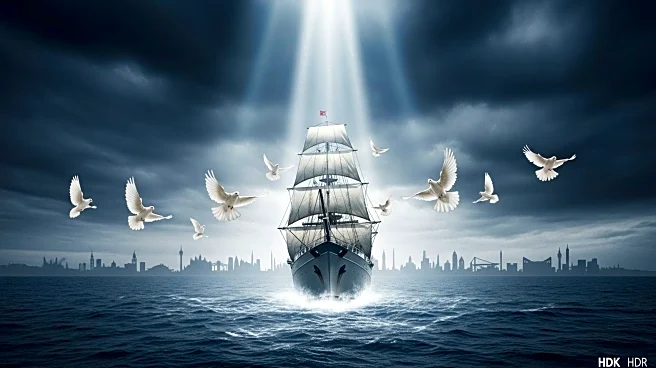What's Happening?
Israeli forces have intercepted at least 21 out of 43 ships carrying humanitarian aid to Gaza, according to flotilla organizers. The flotilla, consisting of nearly 500 activists, includes notable figures such as climate activist Greta Thunberg and Mandla Mandela, Nelson Mandela's grandson. The group aimed to break the long-standing Israeli blockade of Gaza and deliver aid to Palestinians. Despite being warned by Israeli authorities not to enter a designated 'danger zone,' the flotilla proceeded, leading to the interception. Activists on board were reportedly safe and are expected to be deported. The interception has drawn international condemnation, with Turkey's Foreign Ministry labeling it an 'act of terrorism' and a breach of international law.
Why It's Important?
The interception of the aid flotilla has significant implications for international relations and humanitarian efforts in the region. The blockade of Gaza has been a contentious issue, with many international actors calling for increased humanitarian access. The involvement of high-profile activists and the subsequent global protests highlight the widespread concern over the humanitarian situation in Gaza. This incident may strain diplomatic relations between Israel and countries whose citizens were involved in the flotilla, potentially impacting future international cooperation on Middle Eastern issues. The protests also underscore the global solidarity with the Palestinian cause, which could influence public opinion and policy decisions in various countries.
What's Next?
The activists involved in the flotilla are expected to be deported, as stated by Italy's Foreign Minister. The international community may continue to pressure Israel to allow more humanitarian aid into Gaza. Protests are likely to persist, potentially leading to further diplomatic discussions or actions by countries whose citizens were involved. The situation may also prompt renewed debates within international forums about the legality and humanitarian impact of the Gaza blockade. Stakeholders, including governments and humanitarian organizations, may seek alternative methods to deliver aid to Gaza, possibly through diplomatic channels or negotiations with Israeli authorities.
Beyond the Headlines
The interception of the flotilla raises ethical questions about the balance between national security and humanitarian needs. The blockade, intended to prevent arms smuggling into Gaza, also restricts essential supplies, affecting the civilian population. This incident highlights the ongoing struggle to address humanitarian crises within the framework of international law and security concerns. The involvement of prominent activists brings additional attention to the issue, potentially influencing public discourse and policy. Long-term, this event may contribute to shifts in international policy regarding humanitarian access and the rights of activists to engage in non-violent protest.











